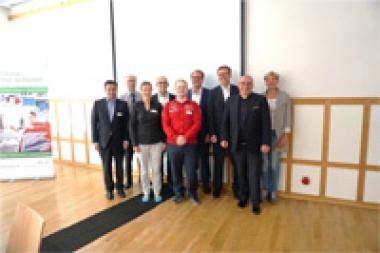Resolutions adopted by the virtual Annual General Meeting of Lenzing AG
At the 77th Annual General Meeting of Lenzing AG, which was once again held virtually on April 14, 2021 via livestream due to the COVID-19 pandemic, the members of the Managing Board and Supervisory Board were formally discharged from liability for the business year 2020. KPMG Austria GmbH Wirtschaftsprüfungs- u. Steuerberatungsgesellschaft was appointed to serve as the auditor of the annual financial statements and consolidated annual financial statements for the business year 2021.
Furthermore, the Annual General Meeting adopted the resolution on the compensation to be paid to Supervisory Board members as well as the principles underlying the remuneration of the members of the Managing Board. In addition to financial performance criteria, the remuneration policy of Lenzing AG regulating the multi-year, performance-oriented remuneration paid to the Managing Board members will also be linked in the future to non-financial sustainability criteria (ESG) designed to further promote the sustainable business strategy of Lenzing AG.
Fully on track strategically
The Managing Board of Lenzing AG presented the business development of the year 2020, a strategic outlook and sustainability strategy including the relevant roadmap to achieve climate targets to the participating shareholders. In 2019, Lenzing made a strategic commitment to reducing its greenhouse gas emissions per ton of product by 50 percent by the year 2030. The goal is to operate in a climate-neutral manner by 2050.
The substantial investments made in Thailand and Brazil not only support Lenzing in its transformation to a supplier of environmentally compatible specialty fibers but also comprise an important milestone on this journey which sustainably increases the company’s enterprise value.
The implementation of these two key projects is proceeding ahead as planned in spite of the direct impacts of the coronavirus crisis. The pulp plant in Brazil is scheduled to be put into operation in the first half of 2022 and will significantly increase Lenzing’s own in-house supply of dissolving pulp. Production in Thailand is expected to commence towards the end of 2021, further raising the share of eco-friendly specialty fibers in the Lenzing product portfolio.
New appointments to the Supervisory Board
Dr. Veit Sorger retired from the Supervisory Board of Lenzing AG on his request effective at the end of the Annual General Meeting. Veit Sorger had been a Member of the Supervisory Board since 2004 (also serving as Deputy Chairman since 2011) and served on various Supervisory Board committees.
The Annual General Meeting elected Dr. Markus Fürst, Managing Director of B&C Industrieholding GmbH, and Thomas Cord Prinzhorn, MBA, CEO of Prinzhorn Holding GmbH, to serve on the Supervisory Board until the end of the Annual General Meeting resolving upon the discharge of the Supervisory Board members for the business year 2024.
Lenzing AG













